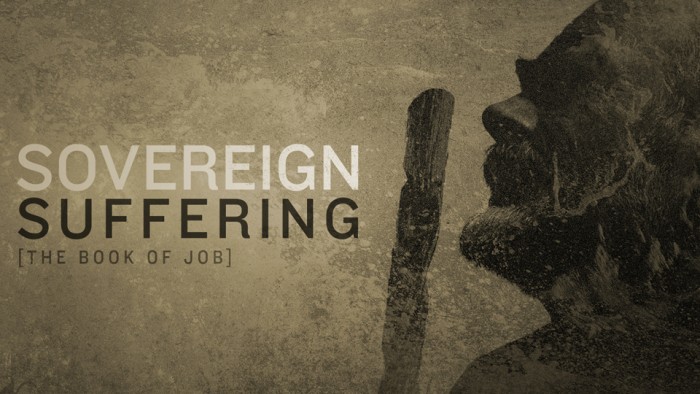Have you ever had a friend or family member who had two cents worth of opinions on everything? But their two cents rarely seemed to have much bearing on the issues at hand?
Such a person would have great affinity for someone like Bildad. It seems like having to wait through Zophar, Eliphaz, and Job, just like a balloon filled to max with air, has him ready to burst and so the second Job catches his breath Bildad utters the six-verse declaration of God’s greatness that is chapter 25.
GOD’S GREATNESS
The Lord is so great that, notice 25:5-6,
Behold, even the moon is not bright, and the stars are not pure in his eyes; how much less man, who is a maggot, and the son of man, who is a worm!
I’m not sure Job would disagree with anything Bildad has said. The speech is reverent, but utterly irrelevant. And so Job promptly responds in 26:4 by saying,
With whose help have you uttered words, and whose breath has come out from you?
It seems like Job is on to the friends’ role as unwitting stand-ins for Satan. 26:4 essentially asks, “Who has inspired the words you have spoken to me? It cannot be the God I know.” Just follow along from 26:7-14 as we hear about the greatness of this God Job knows. He:
- “stretches out the north”
- “hangs the earth on nothing”
- “binds up the waters”
- “covers the face of the full moon”
- “inscribes a circle on the waters”
- “astounds the pillars of heaven with his rebuke”
- “stills the sea”
- “shatters Rahab” (ANE sea monster)
- “makes fair the heavens”
- “pierces the fleeing serpent”
And what a majestic conclusion comes in 26:14,
Behold, these are but the outskirts of his ways, and how small a whisper do we hear of him!
But the thunder of his power who can understand?
Job has just ignited a theological time bomb that will explode the Counseling System of his friends. He says, “God reigns sovereign over all the created order and it’s only by shaking the created order that He will judge and defeat evil (evil he depicts in chapter 26 with Sheol, the sea, Rahab, and the fleeing serpent). Your Counseling System cannot account for this Sovereign Lord of all. His rule and control gets worked out in ways you can’t and won’t expect. It’s utterly surprising.
The question is will God’s sovereignty be a comfort to Job in the midst of his suffering?
SURPRISING SOVEREIGNTY
What will you do when God’s sovereignty surprises you? When His sovereign will throws you for a loop, what will be your first response? “How dare He do this? How dare He bring that into my life?” Or will God’s sovereignty be a comfort in the midst of your suffering?
Let’s notice two implications, from Job’s experience in this text, about God’s surprising sovereignty; two reasons why His sovereignty should be a comfort to us in suffering. Look back with me at 23:10, a verse that highlights these two points.
Job has just previously said, “I cannot find God. He seems to have deserted me.” Eliphaz says God is “high in the heavens” too great to be bothered with the affairs of men; Bildad says men are as maggots and worms when compared to the sovereign God of the universe, but notice Job’s great faith at the beginning of 23:10,
But he knows the way that I take . . .
This is a Hebraic way of saying, “He knows me. Even though I can’t seem to find Him, I know He has not forgotten about me.” Which leads to the first implication of surprising sovereignty: surprising sovereignty draws near. If you are suffering and are tempted to think God has deserted you, or if you have friends like Job’s who tell you God doesn’t care about your pain, take great comfort in these words: God knows His own and draws near to them. And He draws near to us, ultimately, through the work of His Son – Jesus Christ.
If you are not a Christian, the Bible says there is a time when God will come back and draw near to all mankind – it’s that final judgment Job’s longs for in chapter 24. Should you remain in sin and unbelief, His drawing close will be the most terrifying event you will ever know, for His justice must punish sin. But if you turn from your sin to Christ tonight in repentance and believe that He died on the cross to satisfy God’s judgment against your sin, God will draw near to you not with the sword of judgment, but with the joy of salvation and eternal life. I pray you would know this life-giving, paradigm-shattering sovereignty of God that gives new life to dead sinners.
The second implication I want you to see is that surprising sovereignty dooms fear. Look at how 23:10 ends,
. . . when he has tried me, I shall come out as gold.
“Yes,” Job says, “God reigns sovereign over my suffering – He’s trying me right now in this pain – but I need not fear what He’s doing for I will come out as gold.” Job’s friends put God’s sovereignty before His eyes so he would see his suffering as rather ordinary judgment for unrepentant sin. Yet, Job believes in God’s unpredictable power to use His suffering for unfathomable good.
Fear not, I am with thee, O be not dismayed,
For I am thy God and will still give thee aid;
I’ll strengthen and help thee, and cause thee to stand
Upheld by My righteous, omnipotent hand.
Is that a song you can sing in suffering? I hope so. Surprising sovereignty draws near and dooms fear. Will God’s sovereignty be a comfort to you when you suffer?
This post is adapted from my recent sermon, “Suffering with Eliphaz and Bildad,” on Job 22-26.

